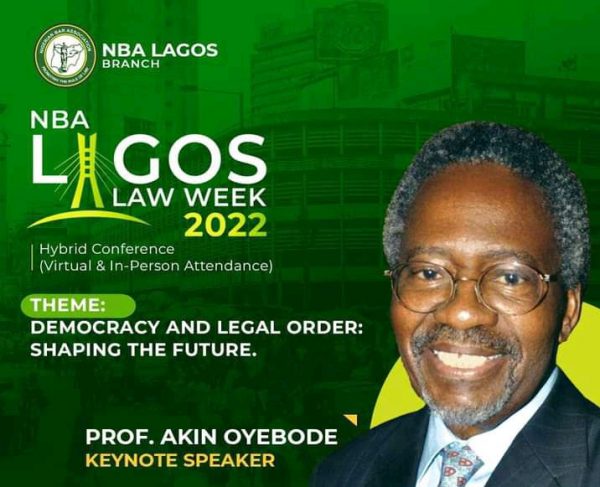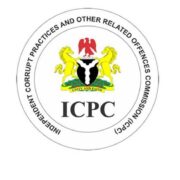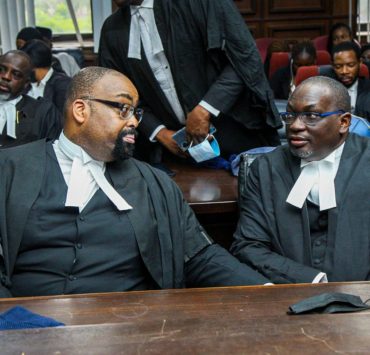Democracy and the Legal Order: Shaping the Future

Lawyard is a legal media and services platform that provides…
Being a paper delivered by Prof. Akin Oyebode at the 2022 NBA Lagos Branch Law Week on Monday, March 21st, 2022.
Introduction
The lesson of inevitability of democratic values within the legal order is not lost on any serious legal practitioner or even casual observer of goings-on in society and indeed the human destiny. Of the multifarious problems afflicting the country currently hardly is anything more benumbing than the crises and contradictions inherent in our practice of democracy vis-à-vis the legal order. The situation would have been laughable if it was not so tragic. That a country so blessed with human talents and incredible natural resources has continued to walk on its head is totally stupefying and inexplicable. However, it is appurtenant to interrogate the historical antecedents of Nigeria in order to lay bare the characteristics of the contemporary legal order and difficulty to grapple with the desiderata of modernity and progress.
The Precursors of the Nigerian State
Nigeria owes its creation to the antics of British imperialism. What is important to bear in mind is that when the British arrived in these parts, they carried along in their knapsacks English law and instrumentalities of conquest and subjugation of the restless natives. Nigeria, being one of the last territories to be colonized by the perfidious Albion, was subjected to the most distasteful aspects of race supremacist ideology of disdain and disrespect for the traditions and mores of the indigenous population. This attitude had been practiced and perfected by the British in relation to the native peoples of America and Canada, Australia and New Zealand, India, etc. This superiority complex among the English was so deeply ingrained in their psyche as the writings of Shakespeare reveal, Tempest and Othello, being notable examples. As recently as 1857, the US Supreme Court in the Dred Scot case still had the temerity to declare that the black man had no rights that the whites needed respect, more so that he was only four-fifths of a man!
Wherever the English went, he could relish in the thought, as Palmerston had intoned, that the long arm of the English law would always protect him. Indeed they refused to subject themselves to the jurisdiction of the native courts which were thought to be infra dignitatem to English law which they had transported to far-flung colonial territories as instruments of colonial hegemony and control. In Nigeria as elsewhere, they had created their own special courts applying English law and rejecting all native laws and customs as being “repugnant to natural law, equity and good conscience”, a code phrase for English law. It took the genius and courage of judges such as J.I.C. Taylor and other like-minded jurists to wean themselves off slavish adherence to English law and practice by striking blows for authenticity and independence of the Nigerian legal order, be it in relation to the rights of children born out of wedlock or the recognition of polygamy and the right to inherit as guaranteed under native law and customs. By the time Nigeria became politically independent, it had become cognizable to enlightened legal opinion that the repugnancy doctrine advocated by the British was indeed repugnant to our sense of values, propriety and cultural wholesomeness.
Democracy, Nigeria Style
It is no exaggeration to aver that in Nigeria, democracy is very much a work in progress. Having endured nearly 400 years of the slave trade and 100 years of British colonial exploitation and oppression, the Nigerian people had not been properly sensitized into the norms and practices of democratic governance. However, this is not totally unexpected of a people reared in unquestioning obedience to the whims and caprices of the traditional rulers, unelected elders and undemocratic belief systems stamped on the consciousness of the people after centuries of social conditioning and cultural manipulation.
Needless to say, the first few years of the practice of majoritarian democracy in Nigeria were marred by different military junta which had hijacked political power and held the country hostage for decades. Since militarism and democracy are odd bed-fellows, it was hardly surprising that the Nigerian militariat succeeded in arresting the country’s progress towards democracy and sought to entrench undemocratic elements within Nigeria’s political firmament. The most galling bequest of the military dictators was Decree No 24 of 1999 which it sought to pass off as the constitution of the country after its departure from the country’s political stage.
Regrettably, rather than jettisoning that evil and unbecoming instrument, the incoming civilian rulers continue to live the lie that Nigeria was operating under an autochthonous fundamental law with fraudulent claims to the effect that it originated and had the consent of the people. The ringing statement by the Patriots that the 1999 Constitution lied against itself is one not to be forgotten in a hurry. Nigerians bought for themselves a pig in poke and for as long as we refuse to consign the despicable instrument to limbo for that long would the legitimacy of the country’s highest law be a rude joke and an unacceptable assault on international best practices.
Nevertheless, the lack of a universally agreed definition of democracy may avail our unrepentant defenders of the status quo in justifying the 1999 Constitution. Yet, truth be told, the illegitimacy of the Constitution puts a big question mark on nearly everything that has happened in this country since the people in agbada replaced those wearing starched khaki uniforms. To borrow the words of Mr Justice Jackson of the US Supreme Court in describing pornography, although we might be unable to define democracy, we all know it when we see it.
Accordingly, the essential ingredients of democracy include supremacy of the law, separation of powers, checks and balances, sanctity of the ballot-box, presumption of innocence, freedom of expression, due process of law, independence of the judiciary, etc. In other words, democracy presupposes the finer elements of western liberal democracy.
So, can we really be said to be practicing democracy? Many have averred that what we actually have is a civilian dispensation while democracy would seem to be a never-never land. Except and only to the extent that we cannot practice democracy without democrats, Nigeria still has a long way to go in order to arrive at the Eldorado of democracy.
The Nature of the Nigerian Legal Order
Undoubtedly, Nigerian law and legal order are yet to shed their British complexion. As I had observed a few years ago the “anglo-Saxons,” to borrow Ayandele’s colorful expression, are in no hurry to do away with their colonial antecedents, white wigs, black gowns, quaint mannerisms, strange forms of address and all in a bid to retain the alien character and appearance of lawyers of a bygone colonial era. Unlike some erstwhile colonial territories such as the United States and Canada which had admitted novelty and reforms into their legal systems, Nigeria has stubbornly refused to alter the modalities of both its law and practice.
Yet, the efficacy of a legal order stems very much from the extent to which it has captured and reflects the mores, values and idiosyncracy of its addressees. So much we have learnt from advocates of the Historical School and lately from Thomas Friedman’s concept of legal culture. As underscored by Omoniyi Adewoye, Nigeria’s leading legal historian, the imposed British colonial law bore all the imprint of alien domination and oppression.
It is for this reason that any discussion of the Nigerian legal order must begin with a recognition of its colonial heritage and continued dependency on an alien power. Whether we speak of the legal system or legal order, we must realize that legalism bereft of a nexus with the thought processes and attitudinal chemistry of the people is of little relevance in coming to grips with the existential reality of a peripheral, dependent capitalist enclave such as ours.
If indeed we go by the dictum of a government of laws and not one of men as propounded by Chief Justice Marshall in Marbury v.Madison (1803), it would be straining logic too far to aver that Nigeria’s legal order was indeed one founded on law and due process. In a situation of an illegitimate Constitution, rancorous law-making, conflicting judicial orders, widespread disrespect for law and order, rising incidence of self-help, inability or refusal by the law-enforcement agencies to perform their duties and lack of trust and confidence by sections of the population in the state apparatus, it becomes highly problematic to envisage fidelity to law as an instrument of peace, order and good government.
In view of the foregoing, it would seem apposite to pose the question as to the potential of the legal order to shape and aid the evolution of a true democracy in Nigeria. Law being an instrument of social change, it would simply be futile to contemplate the inter-relationship of democracy and the legal order, more so in a setting as fractious as Nigeria.
The beginning of wisdom about contemporary Nigeria is that we are not yet a democracy but merely a civilian arrangement. Accordingly, we need to embark on a transition from civil rule to a full-fledged democratic society in order to take full advantage of government of the people, by the people and for the people. It is only by so doing that we can conceive an effective role for the legal order. To the extent that a legal order presupposes concomitants of democracy, to that extent would it be illusory to attempt to move Nigeria to another level through the instrumentality of the legal order.
The coterminous nature of both democracy and the legal order is such that one cannot be pursued without the other. Legalism unaccompanied by the benefits and allure of democratic values is apt to result in outright fascism and blind adherence to the wiles of dictators and undemocratic forces. Therefore, a way has to be found to convince Nigerians on the desideratum of democracy as an integral part of the quest for an effective legal order.
Pursuant to this, lawyers must be ready, willing and able to be at the vanguard of the struggle for a better society. We should always remember that V. I. Lenin, Fidel Castro and Nelson Mandela were lawyers who stood on the barricade of the liberation struggle of their people. Our lawyers should, therefore, make a conscious choice to depart from self-seeking, self-serving and self-conceited motives in favour of ideals that would ensure life more abundant for the preponderant majority of our people. Only thus can the profession attract greater understanding, relevance and empathy among compatriots.
The legal profession is today at a cross-roads. With a multiplicity of problems afflicting law and the legal order, lawyers must rise up to the occasion by bringing to bear their special and unique knowledge of the workings of the legal system on ways and means of restoring hope, trust and confidence among the people generally. Since popular acceptability appears to be the touchstone of democracy and good governance, no effort should be spared toward being harnessed in steering the legal order along the path of consolidating democratic values, otherwise, yearnings for a better society might end up being really little more than a pie in the sky.
Concluding Remarks
We are living in a world earnestly yearning for a better society. How this is to be achieved presents some difficulty. To many, democracy presents a most viable mechanism for attaining this objective. The situation in Nigeria is complicated somewhat by the deformed state of its democracy as well as the overarching colonial coloration of its legal order.
The task of shedding its colonial heritage is no less daunting than that of the legal system as focus for widening the democratic impetus in Nigeria’s trajectory to a higher level of social organization. Since democracy is irretrievably intertwined with a functioning legal order, it stands to reason that creating a viable society is a laudable goal worth pursuing.
It remains for me to express sincere appreciation to the Lagos Branch of the NBA for enabling me to share with you my thoughts on democracy and the legal order and to wish you all a successful annual law week.
Lawyard is a legal media and services platform that provides enlightenment and access to legal services to members of the public (individuals and businesses) while also availing lawyers of needed information on new trends and resources in various areas of practice.















